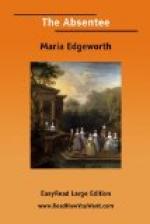‘Dear me, Miss Nugent,’ cried Petito, Lady Clonbrony’s woman, coming in with a face of alarm, ’not dressed yet! My lady is gone down, and Mrs. Broadhurst and my Lady Pococke’s come, and the Honourable Mrs. Trembleham; and signor, the Italian singing gentleman, has been walking up and down the apartments there by himself, disconsolate, this half-hour, and I wondering all the time nobody rang for me—but my lady dressed, Lord knows how! without anybody. Oh, merciful! Miss Nugent, if you could stand still for one single particle of a second. So then I thought of stepping in to Miss Nugent; for the young ladies are talking so fast, says I to myself, at the door, they will never know how time goes, unless I give ’em a hint. But now my lady is below, there’s no need, to be sure, to be nervous, so we may take the thing quietly, without being in a flustrum. Dear ladies, is not this now a very sudden motion of our young lord’s for Ireland?—Lud a mercy! Miss Nugent, I’m sure your motions is sudden enough; and your dress behind is all, I’m sure, I can’t tell how.’—’Oh, never mind,’ said the young lady, escaping from her; ‘it will do very well, thank you, Petito.’
‘It will do very well, never mind,’ repeated Petito muttering to herself, as she looked after the ladies, whilst they ran downstairs. ’I can’t abide to dress any young lady who says never mind, and it will do very well. That, and her never talking to one confiDANtially, or trusting one with the least bit of her secrets, is the thing I can’t put up with from Miss Nugent; and Miss Broadhurst holding the pins to me, as much as to say, Do your business, Petito, and don’t talk.—Now, that’s so impertinent, as if one wasn’t the same flesh and blood, and had not as good a right to talk of everything, and hear of everything, as themselves. And Mrs. Broadhurst, too, cabinet-councilling with my lady, and pursing up her city mouth when I come in, and turning off the discourse to snuff, forsooth; as if I was an ignoramus, to think they closeted themselves to talk of snuff. Now, I think a lady of quality’s woman has as good a right to be trusted with her lady’s secrets as with her jewels; and if my Lady Clonbrony was a real lady of quality, she’d know that, and consider the one as much my paraphernalia as the other. So I shall tell my lady to-night, as I always do when she vexes me, that I never lived in an Irish family before, and don’t know the ways of it—then she’ll tell me she was born in Hoxfordshire—then I shall say, with my saucy look, “Oh, was you, my lady?—I always forget that you was an Englishwoman:” then maybe she’ll say, “Forget!—you forget yourself strangely, Petito.” Then I shall say, with a great deal of dignity, “If your ladyship thinks so, my lady, I’d better go.” And I’d desire no better than that she would take me at my word; for my Lady Dashfort’s is a much better place, I’m told, and she’s dying to have me, I know.’




